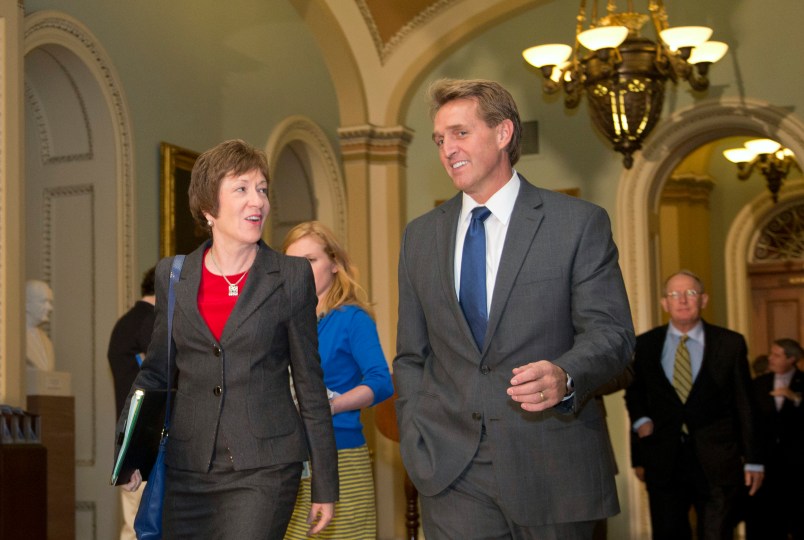The controversial GOP tax overhaul passed the Senate by a razor-thin margin of 51 votes over the weekend, and the lawmakers who reluctantly put the bill over the top say their votes were secured by promises from President Trump and Republican leadership on an array of related and un-related issues—from health care market stabilization to protection for young immigrants.
Today, those promises are on shaky ground.
Sens. Susan Collins (R-ME) voted for the tax bill on the basis of three promises: that Congress would pass and the president would sign bills to restore government subsidies to insurance companies that Trump defunded earlier this year, set up a federal reinsurance program, and waive deep automatic cuts to Medicare that otherwise would be triggered by the tax bill’s sky-high cost. Jeff Flake (R-AZ), who previously withheld his vote over concerns about the deficit, said he was swayed by a promise to include him in future negotiations on DACA.
In an ominous sign for Collins, the short-term funding deal Congress hopes to pass this week to avoid a government shutdown will not include either health care measure—which are aimed at mitigating some of the harm done by the tax bill provision killing Obamacare’s individual mandate.
Collins told reporters this week that she’s “confident it’s going to happen before the end of the month,” citing “a very clear commitment” from Trump and Senate Majority Leader Mitch McConnell. But House Speaker Paul Ryan said he had no part of this deal. And House conservatives say they see no way these bills—which they’ve derided as “bailouts” for insurance companies—pass the lower chamber before the end of the year.
“It’s probably unlikely we’ll see either one until January,” Rep. Richard Hudson (R-NC), a member of the GOP whip team, told TPM. “We have to get a budget agreement, then look at appropriations, and then we can look at some of these other issues. My guess is that it’ll be kicked to January.”
Other Republicans, including Rep. Mark Meadows (R-NC), saw more wiggle room, and said it’s not impossible the House passes Alexander-Murray and reinsurance as long as they’re paired with some health care deregulation to please conservatives.
“I do see a number of scenarios where that could get included,” he said. “We’ve consistently said we’re willing to do CSRs if it’s a transition” to repealing Obamacare.
When TPM asked if Collins’ bill is transitional by definition since it only provides two years of funding, Meadows laughed. “No, if you put something in for a two-year deal, it’s probably eternal. But if you give my constituents some flexibility, I’m willing to look at that.”
Collins’ demand that Congress waive the automatic spending cuts, on the other hand, will all but certainly be met.
“I can’t imagine any scenario where there’s not a waiver for PAYGO,” Meadows said. “It’s using a hammer when maybe a scalpel would do. So I don’t see that, even among conservatives, being supported. A waiver ultimately will happen.”
Pressed on this uncertainty, and whether she has faith these policies will become law in time to win her vote on the final tax bill, Collins quipped: “Well, we’ll see. The president has pledged to work with us, and understand the agreement that was made, and obviously the president has a great deal of influence.”
As for Flake, who told Time Magazine he has an “an iron-clad guarantee that we’ll get it done” regarding the fate of roughly 800,000 immigrants who were brought to the U.S. as children, he declined Wednesday to answer TPM’s questions about when a meeting will take place and what has been discussed so far.
“We’re negotiating, let me put it that way,” he said.
Though DACA officially expires next March, tens of thousands of young people have already lost their temporary legal protections and some have even faced deportation.
Bill Hoagland, a top staffer for decades on the Senate Budget Committee and now the senior vice president of the Bipartisan Policy Center, told TPM Flake “might be buying a pig in a poke.”
“I don’t think he got any kind of sense here of what it means that DACA will be ‘considered,'” Hoagland said. “He wants it done by the end of the year, but the majority leader made it clear it’s not a crisis until March.”










